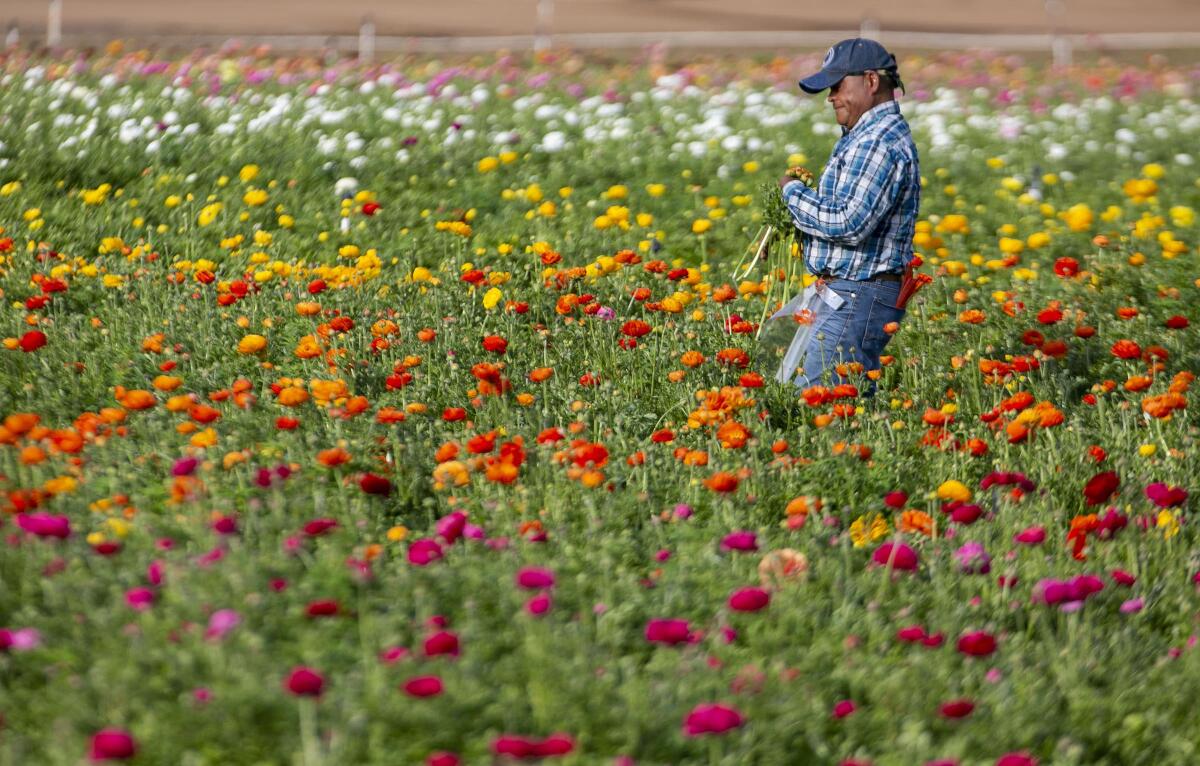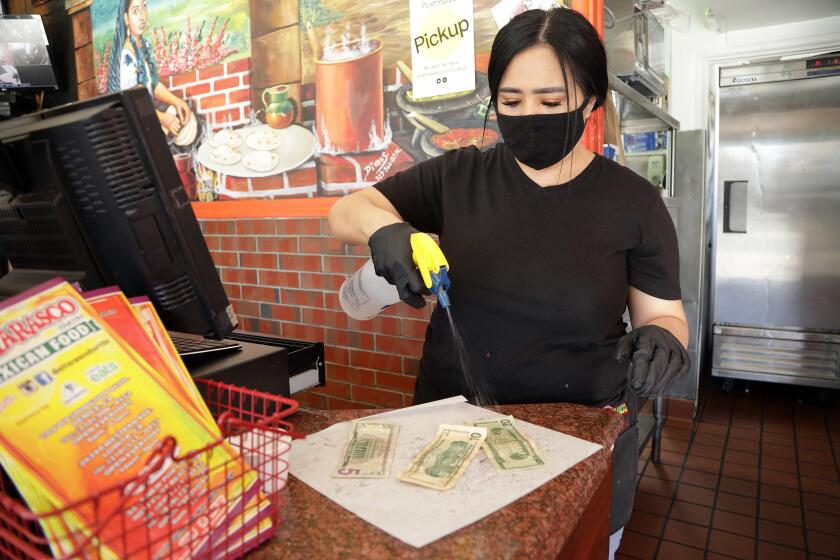Coronavirus hit California’s cut-flower industry at the worst time

- Share via
It happened this fast: Shoppers frightened by the novel coronavirus ransacked grocery stores. Store managers shifted staff to restock shelves. The floral booth went empty. California’s cut-flower industry imploded.
Sure, there are lots of nuances to this tale of tumbling economic dominoes. But at its core is the simple fact that few will buy a perishable luxury item when they fear for their lives. That could spell the end of many farms in California’s $360-million cut-flower industry.
Since mid-March, sales have fallen an average of 85% on California’s 225 flower and foliage farms, while the labor force has dropped by a similar proportion, according to the California Cut Flower Commission, a state agency that promotes the industry.
“We have companies that won’t be here when it’s over,” said David Pruitt, chief executive of the commission.
The novel coronavirus has proved as lethal on an economic scale as it is on the human scale, hitting a highly vulnerable industry in the most precarious part of the season.
These are some of the unusual new scenes across the Southland during the coronavirus outbreak.
“The cut-flower industry has been battling offshore production for many years, and margins are razor thin; so it’s kind of a tipping point,” said Michael Mellano, CEO of Mellano & Co., a third-generation grower and wholesaler headquartered in Los Angeles’ downtown Flower District.
“This is our busiest and most profitable time of the year,” Mellano said. “So, it’s absolutely the worst time for something like this to happen.”
Mellano said he laid off more than 90% of his staff and went into survival mode, hoping to gear up his Southern California and Las Vegas distribution hub when the market revives.
There probably won’t be a grand reopening for Lompoc-based Ocean View Flowers, which produced 40 million stems only two years ago. Its produce-growing parent company, Santa Barbara Farms, closed the flower operation permanently, according to company and industry sources.
Eufloria, whose boutique roses have adorned New Year’s Day floats in Pasadena and thoroughbred horses at Churchill Downs, announced it would shut down its Nipomo farm on March 18. It laid off most of its workers and donated unsold stems to hospitals and nursing homes.
But such was the outcry from fans and clients, Eufloria reopened two days later.
“We are starting to bring some of that employment back,” sales manager Chad Nelson said. “We want to make sure that we’re doing things to keep [plants] producing the way that they should, and if and when this market does come back, then figure out how we can handle those orders.”
Los Angeles Times’ visual coverage of the coronavirus crisis
Coastal farms from San Diego County through Humboldt County likewise laid off most of their workers and went into dormancy at the very time when they usually earn the bulk of revenue — the string of holidays from Valentine’s Day through Mother’s Day.
Chain groceries were among the first to cancel orders, said F.J. Trzuskowski, vice president of sales for Washington-based Continental Floral Greens, which grows the “supporting cast” green foliage for bouquets on three California farms.
“There was no forewarning of this. It was like, ‘Hey, stop all shipments starting now,’” Trzuskowski said. “Then with social distancing, all of a sudden the wholesaler can’t be open to the public. It was a very quick stop to the industry.”
Mellano said he also was hit hard by cancellations of events such as conferences, particularly in Las Vegas.
Weddings were put off, along with their roses, said Eufloria’s Nelson.
“Maybe they didn’t happen right now, but they’re going to happen, right?” he said. “We just don’t know what size they’re going to be when they do happen. Budgets are going to be different.”
The California Cut Flower Commission has told its members that floriculture is protected under the agricultural exemption to closure orders. But with the collapse of the distribution pipeline, the clarification amounts to a technicality. Los Angeles’ historic flower market, like others around the nation, is a ghost town.
“We’ve got wholesale companies closing down and retail stores, which in some cases have business, are losing their normal lines of distribution,” CEO Pruitt said. “We’re in the process of trying to put that back together.”
Pruitt said it’s hard to predict how many farms will fail and which ones will have enough funds left to reboot once demand increases. Growers could switch crops or hedge their bets, as some of the financially strapped greenhouse operations did by leasing space for cannabis cultivation when that crop was added to the California agricultural portfolio in 2016.
Cut flowers are a $1.3-billion industry nationwide, though most of that revenue comes from the sale of imported flowers, predominantly from Colombia, according to the UC Davis Agricultural Issues Center. Domestic growers account for about 27% of national sales, down from 37% roughly a decade ago. California-grown flowers account for three-quarters of the national domestic sales, according to the UC Davis researchers.
Trade deals that favored Andean nations in South America as part of the war on drugs are largely responsible for the decline of California’s flower industry. While Colombia and Ecuador dominate the market for bouquet mainstays such as carnations, chrysanthemums, gerbera and roses, California growers shifted to species that can’t be grown in the cool upland valleys of the Andes.
Longtime California growers switched to Continental’s specialty — the “supporting cast” of greenery in traditional bouquets including ferns, eucalyptus and Israeli ruscus, as well as Christmas trees and holly. That stock can be sustained through the shutdown. Eufloria’s roses, likewise, can survive. But they all have to be nourished, pruned and protected from weather and insects.
“As long as we irrigate and we do pest control, they’re still in good shape for sales when this opens up,” Mellano said. “Probably 35% of our crop mix are annual crops, and those have to be picked when they’re ready, within days, or else they’re lost.”
Among the victims are the ranunculus that carpet the Flower Fields near the San Diego Freeway in Carlsbad — a working farm that also is an important agritourism destination. It closed on March 17, two weeks into its season.
“We are absolutely dependent on the partnership between both tourists and cut flowers in order to make that work,” Mellano said of the Carlsbad farm. “And this year, all of our orders for the ranunculus got canceled by the supermarkets. And the tourism was shut down due to social distancing requirements.”
Only a small portion of the fields will survive in hopes that social distancing rules will relax before summer. Then, people might again be able to go out and smell the flowers, and maybe even buy some.
More to Read
Inside the business of entertainment
The Wide Shot brings you news, analysis and insights on everything from streaming wars to production — and what it all means for the future.
You may occasionally receive promotional content from the Los Angeles Times.













